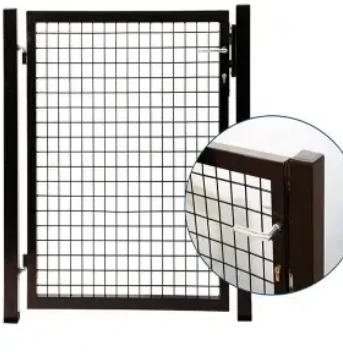
Dec . 29, 2024 04:11 Back to list
Innovative Solutions for Durable Stock Mesh Fencing in Agricultural Settings
Understanding Stock Mesh Fencing A Practical Guide
Stock mesh fencing has become an integral component in agricultural practices, offering a reliable and effective solution for containing livestock while ensuring their safety and the security of farmland. In this article, we will explore what stock mesh fencing is, its advantages, types, maintenance tips, and its role in modern agriculture.
What is Stock Mesh Fencing?
Stock mesh fencing, often referred to as sheep or cattle mesh fencing, is a type of fencing designed specifically for livestock management. It comprises a series of horizontal and vertical wires that are woven together to create a sturdy mesh. This fencing can vary in height, gauge, and spacing between wires, making it adaptable to different types of stock and farming conditions. The primary intent of stock mesh fencing is to keep animals contained while preventing intrusions from predators or pests.
Advantages of Stock Mesh Fencing
1. Durability One of the most significant advantages of stock mesh fencing is its durability. Made from high-quality steel wire, it is resistant to weather conditions and can withstand the wear and tear of livestock. This longevity reduces the need for frequent replacements, ultimately saving farmers time and money.
2. Versatility Stock mesh fencing is highly versatile. It is suitable for various types of livestock, including sheep, cattle, goats, and even horses. Depending on the mesh size and height, farmers can customize the fencing to meet the specific needs of their operation.
3. Cost-effective While the initial investment might be higher than other types of fencing, its resistance to damage and longevity make stock mesh fencing a cost-effective solution in the long run. The maintenance costs are also relatively low compared to wooden or barbed wire alternatives.
4. Enhanced Visibility Unlike solid wood or metal panels, stock mesh fencing offers greater visibility. This transparency allows farmers to easily monitor their livestock and assess their health and safety from a distance.
5. Eco-Friendly Many stock mesh fencing products are made from recycled materials, making them an environmentally friendly choice. Additionally, proper installation and maintenance can reduce the ecological footprint associated with livestock farming.
Types of Stock Mesh Fencing
stock mesh fencing

There are several types of stock mesh fencing available in the market, each designed to cater to specific needs
1. Generic Stock Mesh This is the most common type, suitable for general livestock management. It is durable and can be customized for different heights and wire gauges.
2. Electric Stock Fencing Incorporating electric wires into the mesh can increase its effectiveness by providing an extra deterrent to livestock attempting to escape and predators seeking entry.
3. Horse Fencing Specially designed for equestrian use, horse fencing often combines stock mesh with wooden or fiberglass posts, offering a safe environment for horses while preventing them from getting tangled.
Maintenance Tips
To ensure long-lasting performance and security of stock mesh fencing, regular maintenance is essential
- Inspect Regularly Conduct routine checks to identify any damages or areas needing repair. Look for bent wires or loose connections that could compromise the structure's integrity.
- Rust Prevention If your fencing is not galvanized, apply a rust-resistant coating to raw metal parts. This will help to prolong its lifespan, especially if located in damp or coastal regions.
- Keep Vegetation in Check Regularly trim back any vegetation that may grow around the fencing. Overgrown plants can cause damage and create hiding spots for pests or predators.
Conclusion
In summary, stock mesh fencing is a crucial element in modern agriculture, providing a reliable solution for livestock containment and protection. Its durability, versatility, and cost-effectiveness make it an attractive choice for farmers and livestock owners alike. With proper maintenance and care, stock mesh fencing can serve as a long-lasting barrier, contributing to the efficient management of livestock and enhancing the overall productivity of agricultural operations. As the demand for sustainable and effective farming practices continues to grow, stock mesh fencing represents a step towards a more secure and environmentally conscious approach to livestock management.
-
Why a Chain Link Fence is the Right Choice
NewsJul.09,2025
-
Upgrade Your Fencing with High-Quality Coated Chicken Wire
NewsJul.09,2025
-
The Power of Fence Post Spikes
NewsJul.09,2025
-
The Best Pet Enclosures for Every Need
NewsJul.09,2025
-
Secure Your Property with Premium Barbed Wire Solutions
NewsJul.09,2025
-
Enhance Your Construction Projects with Quality Gabion Boxes
NewsJul.09,2025
Products categories











